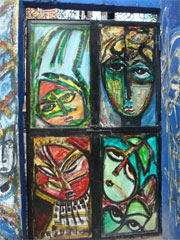After Shock
When Short-pants was just a little girl, she had a big story with menacing words like convulsion, coma, and emergency surgery. A massive growth in the right frontal lobe of her brain was originally diagnosed as cancer, but post-surgery lab tests gave us a break; it was just a brain abscess. Still, there were complications: a secondary infection, meningitis and persistent vomiting as a result of the nasty cocktail of intravenous antibiotics that didn’t seem to be shrinking the abscess as predicted. The MRI made it look as if it was re-forming, like the image of a hurricane gaining speed and force on a tropical weather map. A second brain operation was required to remove the abscess for good.

All hands were on deck. De-facto’s family appeared en masse and quietly took over our home, attending to Buddy-roo, organizing our lives, making sure we ate meals of substance and nourishment. My brother the doctor was on call every night to interpret the medical-speak we encountered each day. My sister, who happened to be in Viet Nam at the time, managed to inspire the Archbishop of Hanoi to put his priests to work in prayer. An e-mail tree was established; we wrote a message every night that was sent out to a few people, who sent it to other people, who sent it to more people, until a web of friends and family had the latest news about Short-pants and put us in their prayers.
We were in crisis mode. We didn’t hesitate to ask for help, and people didn’t hesitate to offer it. Perfect strangers came to our emotional and spiritual aide. Doctors who were friends of friends reviewed her dossier and offered additional opinions. We accepted anything that was given to us, without quid pro quo worries.
As awful as it was, fathoming what life would be like if she didn’t survive, or what it would be like if she did survive but with serious complications, there was also something really simplifying about it all. De-facto and I had a crystal clear sense of purpose every day: to give emotional support to our daughter, to do the medical interface, advocate for her care and to try to hold each other – and our family – together.
A crisis can produce this kind of clarity. We do what needs to be done. We make quiches, soups and casseroles. We bring blankets, we send money. Priorities become certain, we function in highly effective ways despite the lack of sleep, loss of appetite, and moments of extreme despair.
In other words, we rally.
The nightly e-mail network we branched together pales in comparison to the force and velocity of information sharing that exists today. The brute force of the Internet is staggering: a well-loved blogger has a stroke, an entire on-line community assembles to support her family, not only with words, but with money and real-time assistance. When an amazing child whom everyone read rooted for doesn’t make it, there’s an outpouring of financial and moral support from an electronically connected community. An earthquake devastates an entire country and the world rallies to offer aide. It all makes you feel good about what human beings can do.

After Short-pants was released from the hospital and well into her rehabilitation, people started to forget about our family crisis. The urgency of our news diminished; without a daily calamity to report, our update messages went from daily to weekly to monthly to rarely. Everyone returned to their regularly scheduled life, and assumed that we had, too.
Except our life was still upside-down. We were thrilled that she was home, but schlepping out to the rehab hospital three or four times a week, juggling doctor’s visits and follow-up tests as we tried to recapture our own professional schedules was wearing us out. Being careful about keeping a steady stream of attention on Buddy-roo in the midst of all this took energy, too. This was when I was most afraid that I might break down. Not in the thick of the crisis, when everyone was cradling us, when there was clarity and singularity of purpose. It was just as hard – and I had less personal stamina – when we were “out of the woods.” The crisis was over, but our lives were still far from normal.
The awkward memory of this après-crisis phenomenon was prompted by reading one of the blogs in my sidebar, Generation Y, written by a Cuban woman who has to work miracles just to get her posts on the Internet without being censored. She writes, “It especially frightens me that three months from now the suffering will no longer be a headline in any newspaper and people will have ceased to feel the urgency of the Haitian drama.” I’ve thought about that, too. We send our money and we go on about our life. What else can we do?
But I’m getting ahead of myself. The crisis in Haiti is still full-throttle, and will be for some time. Help is needed now. If you haven’t donated, here are some reputable aide organizations. (I donated here.) Or if you’re in the States, all it takes is a single text message. If you blog, here’s another creative way to raise funds. Sending $10 – the cost of two draught beers at my favorite café – will make a difference, when you consider how many millions of people are donating just that. It adds up, fast.
Just remember that the crisis may end for us when the media coverage dies down, but not for them. Whether it’s for Haiti or any other cause – the charity of your choice, or the friend across town who’s grandmother just died – it’s so important to follow up and check back in. Maybe it’s another donation, another mention, another offer to help – even just a quick hello that says you haven’t forgotten – that could mean more than we know.
Well, in fact, I know. It means everything.


January 19th, 2010 at 9:16 am
Beautifully written. As a cancer survivor, on the other side of a crisis, I can say too, it means everything. I’ll always remember what a good friend told me during the middle of my treatment, when I was so confused about living: “Hope doesn’t just come from within you, it comes from all of those around you.” I’m wearing red today and hoping it means more than I can ever know.
January 19th, 2010 at 2:53 pm
Timely post. I donated $10 right away through the txt link, but it doesn’t seem like enough. I’m not swimming in money but I know we can do more. fortunately my children’s school is setting up clothes donation boxes. My heart aches when I see clips of the little children suffering in the streets. We should all remember how good we have it whenever we begin to complain about petty issues. Myself included!
January 19th, 2010 at 3:07 pm
I also forgot to say, I’m glad that your daughter is doing better. I cannot imagine what you went through, I do not believe I would be strong enough to deal. I hope her lifelong prognosis is good. Has she recovered completely?
Best, Dee
January 19th, 2010 at 5:26 pm
Yes! Short-pants recovered completely and continues to thrive. She is also particularly wise, as a result of her ordeal. About this we are grateful every day. Thanks for asking.
January 20th, 2010 at 6:56 pm
which reminds me, i need to send Anissa another postcard.
i donated to PIH as well.
January 19th, 2018 at 5:11 pm
A post I never read! I didn’t think there were any. Hahahahaha
Lordy. Talk about one that resonated. In my case people rallied quickly, and seemed to depart with equal speed. It’s what can happen when they can’t see the things that are missing, and you can’t tell them yourself because it’s your brain that everything has happened to, and you don’t know either.
That’s something like seeing pictures of Haiti and being unable to appreciate its beauty, or any of the challenges it faces. Others who know it well, just see Haiti and don’t pay attention until there’s a disaster. Except that it isn’t as bad as it could have been (“but if you look at a real catastrophe like Katrina”), and you can’t recover quickly enough and people stop pulling for you (****hole countries). It’s been one heck of a ride! Life is like that sometimes for everyone, no?
I followed the link to the blogger who had a stroke, to check in, and offer encouragement. The relevant contact links on their blog are broken. Eight years later, do you know how she’s doing?
I’m glad Short-pants recovered, and is thriving. You too, by the way. Thanks for this. I’ve missed the sound of your voice. It’s nice to run into its memory (as it were).
You don’t have to publish this. I know you’ll be notified of my comment’s presence and that’s quicker than opening up my email, etc. Yes I’m being that lazy this morning. Ha!
Have a great Friday!